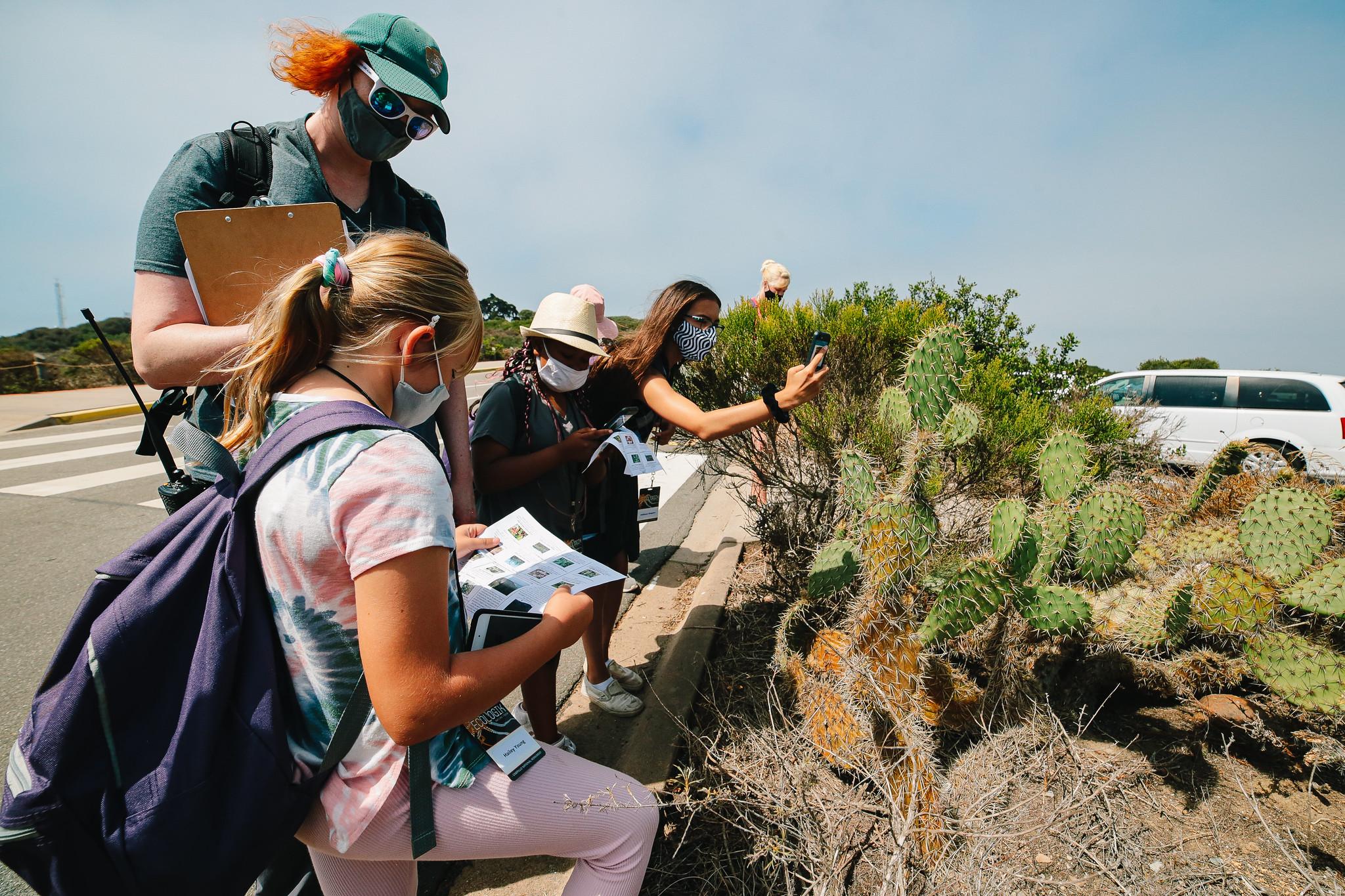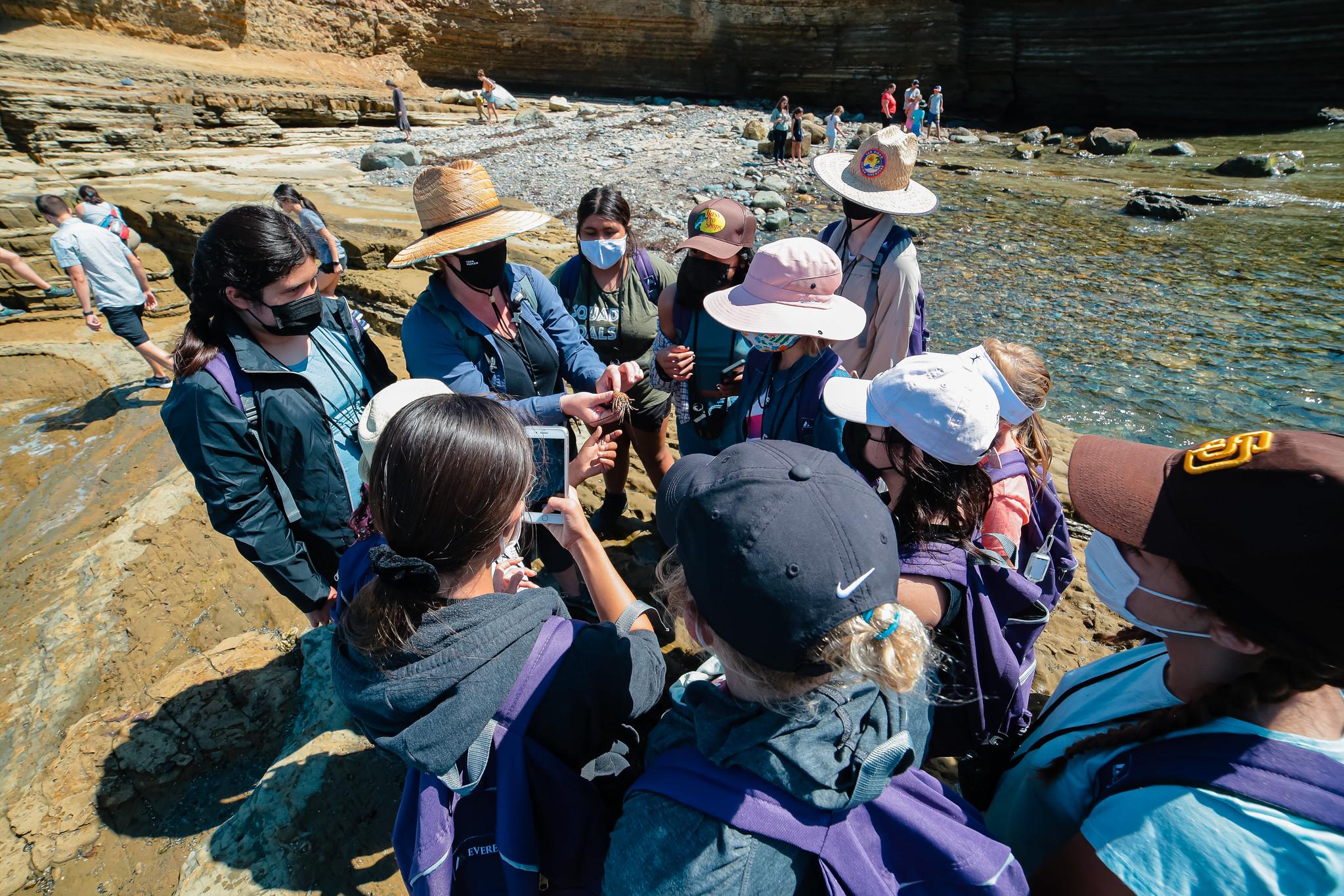Fostering The Next Generation Of Scientists
The EcoLogik Camp at Cabrillo National Monument is a specialized STEM program for girls that turns the park into a living laboratory.
By Kim O’Connell
For a lucky group of girls each summer, a visit to Cabrillo National Monument in San Diego doesn’t just include a hike through the park’s signature scrub-brush habitat, or a visit to its historic and picturesque lighthouse, but activities like radio telemetry and geospatial monitoring, or investigations into ocean acidification and trophic cascades. In addition to hearing from park rangers, the girls get to learn from prominent women in STEM fields, opening their eyes to potential careers.
This is the EcoLogik Camp, a groundbreaking program begun in 2017 in recognition that the park presented an opportunity for underrepresented urban kids—namely girls. According to research included in a story map created by the national park, half of all college graduates are women, yet women make up less than a third of professionals in STEM fields (science, technology, engineering, and mathematics). Only one in ten scientists or engineers is a woman of color. EcoLogik is a free two-week day camp that brings 20 to 30 girls to the park, ranging in age from 9 to 16, for an immersive program of science- and tech-based activities.
“There’s a lot of science that’s done in national parks, and a lot of people don’t know that,” says Samantha Wynns, a conservation biologist and science educator with the park who directs the EcoLogik camp. “Our national parks are really incredible living laboratories. This summer day camp is led by women in STEM and focuses on the real science and tech that we use here.”
Campers are selected through an application process that focuses on diversity in various ways. Campers are bussed to and from a central location to the national monument, which is located about a half hour from downtown San Diego at the tip of the Point Loma Peninsula. In addition to creating equity around transportation—often a barrier to park visitation for many urban dwellers—the bus ride is an essential part of the learning experience, Wynns says. Each morning and afternoon, the bus is the time when campers reflect and discuss the previous day, hear about important women in STEM, and get an overview of the activities to come.
During the camp, each day has a different focus or theme around which all the day’s activities are organized. For example, a day focused on biodiversity might bring girls to the park’s rocky intertidal zone, where the girls might capture information via photography, writing, and art, or where they might participate in tech-based work using geospatial monitoring software or some other tool.

Conservation biologist Samantha Wynns leads campers during the 2021 EcoLogik camp for girls. / NPS, C. Aurrecoechea
“It’s highly specialized but also really immersive,” Wynns says. “There’s a high instructor to camper ratio, with a lot of hands-on, inquiry-based learning opportunities. We have different blocks throughout the day. Exploration of the tide pools could be one block, then some simulated science such as an investigation of ocean acidification. And there’s a lunch and a snack, and they do their reflections on the bus.”
“I love science because there’s so much to explain, and so much to fix in our world,” one camper says in a video about EcoLogik on the park website. “For me,” says another girl, “it’s like your own little game outside, a game that can help you learn.”
In addition to exposing kids to critical thinking and the principles of scientific research, Wynns says, the camp also exposes kids to working scientists, who represent a wide range of fields. Recent guest instructors included Claire Meaders, a biology professor at the University of California-San Diego, and Nicole Yen, who teaches marine science there.
“It’s taken time to cultivate these relationships,” Wynns says. “We want the girls to envision themselves in STEM, and the best way for them to do that is to have role models that they really connect with. The second to last day of camp is a Women in STEM fair, where we invite people from all different STEM fields. The girls get some one-on-one time with these professionals and then we all eat lunch together.”
The camp also creates mentorship opportunities whereby older campers and alumni help lead the younger girls. “We challenge the young ones with the material but it’s nothing they can’t handle, and we have mentor opportunities all the way down,” Wynns says. “We always have a couple alumni come back to be ambassadors. Whenever we split them into groups, we make sure there’s older and younger together, to allow that mentorship to happen.”
To keep the camp free for participants, the camp is funded through direct support from the National Park Service to grants from the Cabrillo National Monument Foundation (for which Wynns serves as the community engagement coordinator), to the San Diego Foundation (which recently allowed the camp to expand to two two-week sessions), as well as the Southern California Research Center and other entities. (Wynns is employed at the monument through a partnership with the Great Basin Institute.) Wild Tribute, the national park apparel company, has also supported the EcoLogik initiative through its 4 the Parks initiative, through which 4 percent of the company’s proceeds are donated to national park projects around the country.
“Not only are we doing more camps, we’re starting to do one-day workshops at places like community libraries, to give other kids the ability to experience a little bit of EcoLogik,” Wynns says. “And we developed during the pandemic an all-virtual EcoLogik that we’ll use as an after-school program.”
Wynns’ ultimate goal is to spread the EcoLogik program to other national parks, and there is some promising interest in that regard, she says. At Cabrillo, Wynns has already worked to expand the monument's suite of environmental education opportunities as well. She created the Conservation + Comics program, for example, which guides students through a thematic nature exploration of the monument, and then art education partners lead students in different ways to convey information in graphic formats such as comics. (STEM is increasingly re-branded as “STEAM” to include an artistic component.)
“I’m a conservation biologist, and when I went back to school to be a scientist, I wanted to solve these global issues,” Wynns says. “Out of all the projects I run at the park, the most effective one that’s moving towards the conservation legacy that I wanted to create is this project. It transforms these girls. I’ve written several letters of recommendation for college applications. I have girls who don’t want the camp to end.”
This article was made possible in part with support from Wild Tribute.

EcoLogik campers study biodiversity in the park's intertidal zone. / NPS, C. Aurrecoechea

 Support Essential Coverage of Essential Places
Support Essential Coverage of Essential Places
Add comment